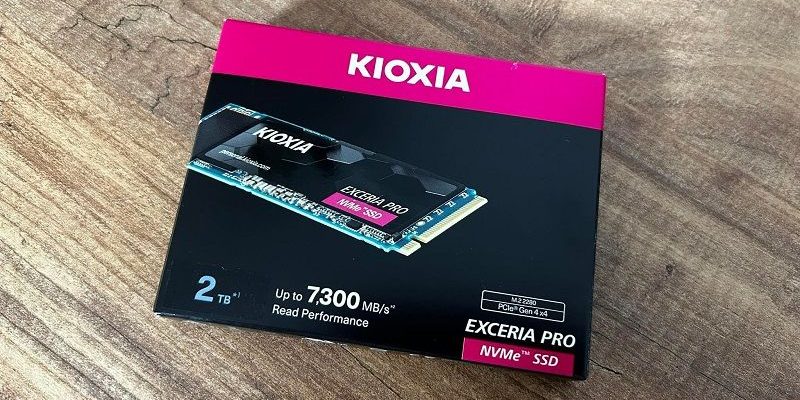In our Kioxia Exceria Pro NVMe SSD review content, we take a closer look at the general features and performance of the model, which has PCIe 4.0 standard.
Kioxia Exceria Pro NVMe SSD review: Kioxia has recently started to gain a solid place in the market with its different products. I’ve been using the Kioxia Exceria Pro NVMe SSD model with 2 TB of storage for a while. I installed it on my personal computer about two months ago and had the chance to use it extensively.
During this process, of course, I had the opportunity to test this model in detail, where I stored dozens of game and project files. In this content, we will take a look at its general features and, of course, its usage performance.
Kioxia Exceria Pro NVMe SSD review / 2TB
Kioxia Exceria Pro NVMe SSD review
We can say that the M2 slot is now a must for both faster loading times in games and faster processing in programs. Offering a storage solution that we can use from the M2 slot, the Kioxia Exceria Pro NVMe SSD is a model with high values in terms of read and write rate. More importantly, this model has the M2 2280 standard.
Of course, there are different storage versions, but if it has a size of 2TB as I tested, this brings with it a very good solution, especially for storing your game and project files. It used to be more expensive to reach models with a high storage ratio. However, with the decrease in prices and the arrival of price-performance-oriented models, higher capacities have started to offer much better solutions.
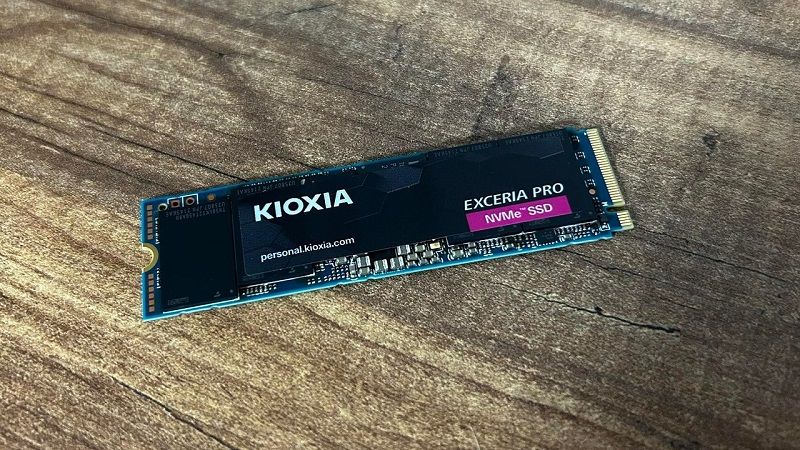
Kioxia Exceria Pro NVMe SSD review
For example, I used to use a 1TB SSD model and it was not enough when we consider the game sizes. I was just throwing the games I played very often into the SSD. Now, when I switched to this 2TB model, I got enough space even for the games I play often and occasionally, as well as for the project files. Especially when I use the files of programs such as Premier Pro, which I use frequently, on this storage unit, it has had a significant impact on performance.
Therefore, if you are going to buy a new SSD, it is useful to think long-term. 1 TB models can probably save the day for now, but in this period when game sizes start to increase, you can also choose higher capacities by thinking ahead. Of course, as with all brands, there are different solutions in different sizes on the Kioxia side. I just wanted to share my thoughts on this subject with you by the way.
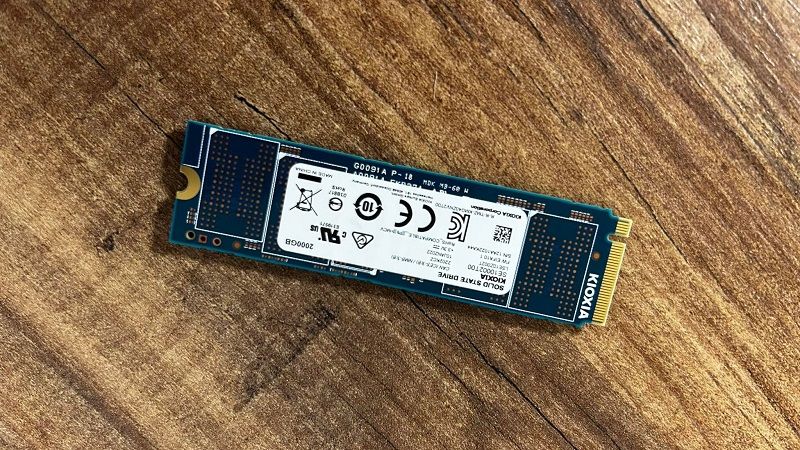
Kioxia Exceria Pro NVMe SSD review
This model, which has a classic M2 SSD design, uses the PCIe Gen 4 interface as its bandwidth. This means that you will get much higher read and write times than many PCIe 3.0 models on the market. Of course, your motherboard must have PCIe 4.0 support. Of course, this does not mean that you cannot use it on your PCIe 3.0 supported motherboard. There will be a noticeable drop in read and write speed when you use it on an older motherboard.
At this point, if you need an SSD right now and you are thinking of collecting a new system in the long term, choosing a PCIe supported SSD would be more accurate. At least you can use these models now and get a much better performance when you update the system.
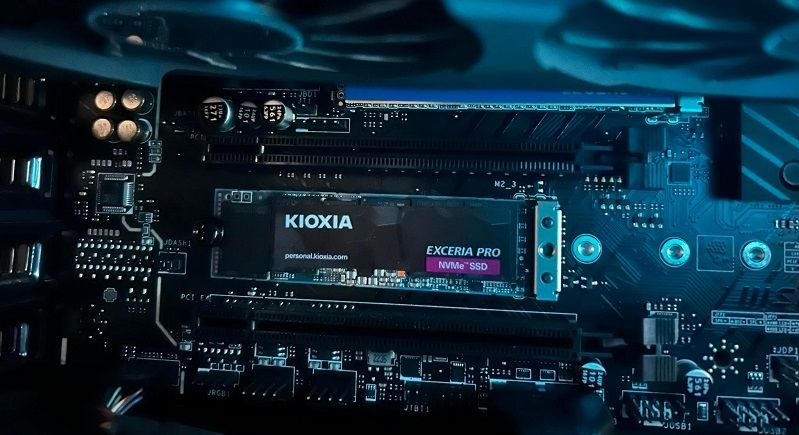
Kioxia Exceria Pro NVMe SSD review
When we look at the figures on the paper, we see that it has sequential read up to 7300 MB/s and sequential write up to 6400 MB/s. In our tests, SSD managed to give results approaching these figures. In our test with Crystal Disk Manager, the SSD model reached 6957 MB/s on the read side and 6413 MB/s on the write side.
In general, values appear a few digits down on the writing side as well as on the reading side. Of course, these numbers may differ depending on the hardware, but in general, we see that it almost reaches the promised values, and even hits the spot on the writing side.
On the file transfer side, you encounter a complete performance. If you have another portable SSD with high read and write speed, you can be sure that you will catch a good speed in file transfer between the two. For example, when I copied a 20 GB file to this SSD, I achieved a speed of 3.20 GB/s per second and the process took almost 7 seconds. Especially if you are dealing with videos and projects with high dimensions like me, you understand how important these speeds are in file transfer.
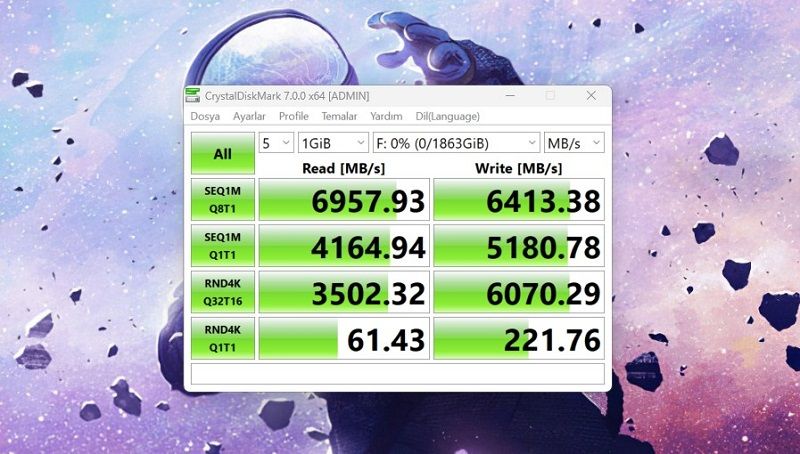
Kioxia Exceria Pro NVMe SSD review
Kioxia has also signed an application for its SSD models. In this application called Kioxia SSD utility, you can see the details of the SSD model you have, such as capacity details, health status, instant SSD temperature and update version. The app also has its own benchmark test. When we tested it here, we encountered 6.61 GB/s read and 6.01 GB/s write values as read speed.
By the way, your SSD runs around 35-40 degrees at idle. Under load, the temperature rises to 65 degrees, especially if you put it under heavy loads like rendering. Of course, let’s mention that there is no separate heatsink on the SSD in our tests here. So when you use a heatsink, you get much lower values. Depending on your case temperature, it goes up to 25 degrees when idle and up to 40 degrees under load. In other words, when you have a heatsink, you get half the temperature performance.
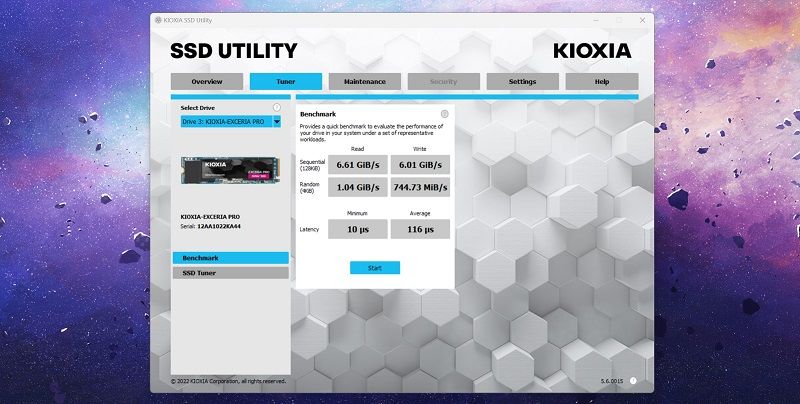
Kioxia Exceria Pro NVMe SSD review
As a result, as you can see in our Kioxia Exceria Pro NVMe SSD review content, the SSD model has become a model that can be preferred with both its performance and features. Speaking of heatsink, if you install a good cooler, you can easily use this SSD model on your PS5 console. With Gen 4 support and high read-write speed, you can be sure that you will get full performance on your console.
If you have a PCIe 4 supported motherboard or, as I mentioned at the beginning, you are thinking of going ahead, I can say that this SSD model is one of the models that will make your work easier and save you time both in games and video works.
Kioxia Exceria Pro NVMe SSD Features
- Capacity: 1TT/2TB
- Format: M.2 2280-S2-M
- Protocol: PCIe 4.0 / NVMe 1.4
- Size: 80.15 x 22.15 x 2.23mm
- Read Speed: 7,300 MB/s
- Write Speed: 6,400 MB/s
- Storage Temperature: -40 ? to 85 ?
- Power Consumption (Active): 8.9 W (typ.)
